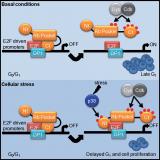16/09/2016
Cellular stress activates an important anti-cancer protein
Researchers at UPF have discovered that the RB protein, responsible for stopping cell proliferation and therefore preventing tumor formation, is activated under cellular stress. The work, led by Eulàlia de Nadal and Francesc Posas, leaders of the research group on Cell Signaling of the UPF in collaboration with the Structural Bioinformatics group of GRIB led by Baldo Oliva and the group of Francisco X. Real (UPF/ CNIO), appears in the journal Molecular Cell.
RB (Retinoblastoma) is a tumor suppressor protein that is altered in many cancers such as lung cancer, melanoma, prostate cancer or breast cancer. Originally, this alteration was detected in retinal cancer, from which comes its name. One of the main functions of RB is to inhibit cell cycle progression before genome duplication, so that cell division does not enter until the proper conditions are not met. Therefore, RB prevents cell proliferation under physiological conditions. That is why RB's inactivation may involve the development of cancer, since uncontrolled cellular proliferation results in tumor formation.
The work done by scientists at the Cell Signaling research group has found that RB is also important to stop cell progression in response to cellular stress. Under these conditions, the brake is essential for cell survival. A very remarkable fact is that this new mechanism predominates over others that normally regulate the activity of RB. Therefore, the external activation of this mechanism could be used to block cell division.
As Francesc Posas, co-leader of the study says, "this discovery may be relevant in cancer biology because RB is a key protein in cell proliferation and many types of tumor coincide on the inactivation of this protein. If we get to reverse this inhibition, we could stop proliferation."
In fact, a RB mutated protein that mimics the activating effect of RB is able to stop cell proliferation in cancer cells. "To carry out our study, we expressed a mutant form of RB that behaves like a super-repressor that blocks the proliferative activity of the cells. Now the challenge is to express this super-repressor in malignant cells in order to unalter the other cells of the body", says Eulàlia de Nadal, co-leader of the article.
With this discovery, the RB protein is reconsidered as a target for drug discovery. Those molecules that are able to mimic its regulation could be of great interest to block cancerous processes cell proliferation and therefore could be used as potential therapeutic agents. One of the most interesting aspects of this discovery is the potential of the RB as a target for the treatment of various cancers. "Initial studies in cells from different cancers seem to indicate that most of them can block their proliferation through this mechanism", the authors say.
Reference work: Gubern A, Joaquin M, Marquès M, Maseres P, Garcia-Garcia J, Amat R, González-Nuñez D, Oliva B, Real FX, de Nadal E* and Posas F*. The N-terminal phosphorylation of RB by p38 bypasses its inactivation by CDKs and prevents proliferation in cancer cells. Molecular Cell. (2016).
Ver la noticia en castellano en la web de la UPF.
Veure notícia en català a la web de la UPF.




